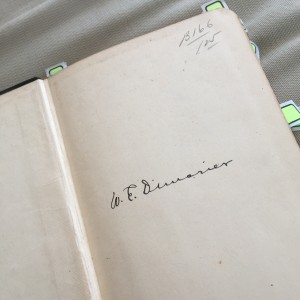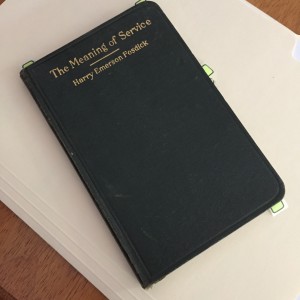The Meaning of Service
Purchase William E. Dimorier: Servant Leader
One of the books found in William E. Dimorier’s personal library was The Meaning of Service, by Harry Emerson Fosdick, published in 1921. It, perhaps, more than any other of William’s books, illustrates his life of service.
Fosdick graduated from Colgate University in 1900, three years before William, so they had probably met one another there. After graduating from Union Theological Seminary in New York City, Fosdick held various cleric positions there over the next few decades.
The Meaning of Service is a 12-week, daily devotional. Each day contains a scripture reading, a narrative to accompany the reading, and a prayer. Each week ends with a comment.
What if George Washington Had Stayed Home?
The fourth week comment of Meaning of Service, contains a paragraph that William marked in pencil. It asserts that if we look out for ourselves before others, we risk missing our true purpose in life. For example, George Washington could have stayed on his plantation instead of joining the American Revolution, but then he would not have become “Father of the Nation.” The paragraph states, “We all have this series of possible selves, from the meanest egoism that like a fledgling bird yammers with open mouth for the world to feed it, to that great self that can embrace within its sympathy and incorporate into its life the welfare of the world.” This sort of worldview might have encouraged William’s giving of himself while expecting very little as reward.
Usefulness Leads to Abounding Life
The summary for week four of the course contains another paragraph, which William annotated with the word, “Good.” This section discusses the ill person who retreats into himself and begins to become absorbed only in his own needs. As the person recovers, he worries less about himself and can spend surplus energy on others. In doing this, he becomes even more healthy. “By as much as he expends himself, giving more than he gets, making his contributions offered greater than his contributions levied, he shows the marks of a well man. For selfishness is sickness, and overflowing usefulness is spiritual health and abounding life.”
We Owe the World All We Can Give
In the eleventh week of Fosdick’s The Meaning of Service, he compares two contemporaries, Napoleon Bonaparte and William Wilberforce. While Napoleon was dominating the world, Wilberforce was trying to abolish the slave trade. William marked the following sentence in the paragraph, “Napoleon assumed the world owed him all that he could get; Wilberforce assumed that he owed the world all that he could give.
Finding Immortality Through Service
Perhaps the quotation William marked from Alice Freeman Palmer, the second president of Wellesley College, best sums up his legacy. “It is people that count. You want to put yourself into people; they touch other people; these others still, and so you go on working forever.”
 Palmer’s words can be applied to William’s vocation to make life better for young people, which ultimately, reached around the globe. William’s influence on people, who in turn, influenced people, and so on, reaches across centuries, too. This can be said for any person who gives of himself to another. The smallest act of kindness can result in a magnitude of good.
Palmer’s words can be applied to William’s vocation to make life better for young people, which ultimately, reached around the globe. William’s influence on people, who in turn, influenced people, and so on, reaches across centuries, too. This can be said for any person who gives of himself to another. The smallest act of kindness can result in a magnitude of good.
This post is an adapted excerpt from the manuscript, Facing the Wind: The Life of William E. Dimorier.
Ann Silverthorn writes about a wide variety of topics in numerous genres. She recently completed a biography of William E. Dimorier (1871-1951), a poet and educator, who dedicated his life to service and leadership. Several new projects are underway.
Purchase William E. Dimorier: Servant Leader
Overview of the Dimorier Project
Facebook: www.facebook.com/AnnSilverthorn
Twitter: @annsilverthorn
Instagram: ann_silverthorn





Leave a Reply